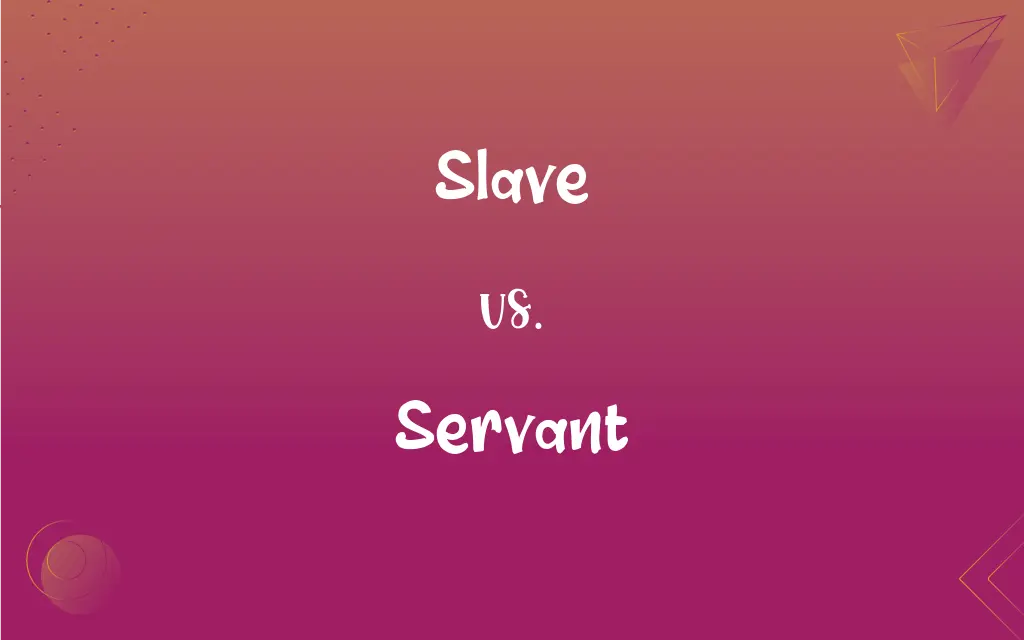Slave vs. Servant: What's the Difference?
Edited by Aimie Carlson || By Harlon Moss || Published on February 12, 2024
A slave is a person who is the legal property of another and is forced to obey them, while a servant is a person employed to perform household or other duties, typically with some personal freedom and compensation.

Key Differences
A slave is owned by another person, lacking personal freedom and autonomy. They are considered property and have no right to refuse work or leave their situation. A servant, however, is an employee who chooses to work for someone else, often in exchange for wages, and retains personal freedoms, including the right to leave their employment.
Slaves are not compensated for their labor, as they are considered the property of their owners. Their living conditions and treatment are determined solely by their owners. Servants, in contrast, typically receive wages or other forms of compensation for their work and have agreements or contracts outlining their duties and rights.
Slavery has a long, global history, often associated with extreme exploitation, human rights abuses, and racial oppression. It has been legally abolished in most countries. Servant work, while it can vary widely in terms of conditions and treatment, is a form of employment and is regulated by labor laws in many countries.
Slavery is typically an involuntary and lifelong condition, with freedom only possible through emancipation or escape. Servitude, however, is a contractual employment that has a specified duration or terms under which the servant can choose to end their employment.
Slavery is universally considered a violation of human rights and is illegal in most parts of the world. Servanthood, when conducted under fair and legal conditions, is an accepted form of employment, although it can be subject to abuses that require legal intervention.
ADVERTISEMENT
Comparison Chart
Legal Status
Considered property without personal rights.
Employed with rights and personal freedom.
Compensation
No compensation for labor.
Typically receives wages or other benefits.
Freedom and Autonomy
No freedom or autonomy; cannot leave at will.
Free to leave or terminate employment.
Historical Context
Associated with oppression and human rights abuses.
A form of employment, varied historically.
Duration of Service
Often lifelong and involuntary.
Contractual and for a specific duration.
ADVERTISEMENT
Slave and Servant Definitions
Slave
A slave is forced to work without pay.
Slaves on plantations were forced to work long hours without any compensation.
Servant
A servant has the freedom to leave employment.
The servant chose to leave her position for a better opportunity.
Slave
A slave has no personal freedom or autonomy.
The life of a slave was characterized by a complete lack of freedom.
Servant
A servant’s work is contractual.
The agreement outlined the servant's duties and rights.
Slave
A slave is considered the legal property of another.
Under slavery, a slave could be bought, sold, or traded.
Servant
A servant can negotiate working conditions.
The servant negotiated her working hours and benefits.
Slave
A slave is a person who is owned by someone else.
The abolitionist movement fought to end the practice of keeping slaves.
Servant
A servant is an employee working in domestic service.
The family employed a servant to help with household chores.
Slave
A slave's status is often inherited.
In many societies, children born to slaves became slaves themselves.
Servant
A servant is typically paid for their labor.
The servant received a monthly wage for his work.
Slave
One who is owned as the property of someone else, especially in involuntary servitude.
Servant
One who is privately employed to perform domestic services.
Slave
One who is subservient to or controlled by another
His boss's slave.
FAQs
Is slavery legal anywhere today?
Slavery is illegal in all countries but still exists in illegal forms.
Can a servant choose their employer?
Yes, a servant can choose whom to work for.
Can a slave legally leave their owner?
Historically, slaves had no legal right to leave their owners.
Do servants have legal rights?
Yes, servants have legal rights, including labor protections.
Can servants negotiate their wages?
Yes, servants can negotiate wages and conditions.
What types of jobs do servants do?
Servants typically perform household tasks like cleaning, cooking, or childcare.
Do servants live with their employers?
In some cases, yes, but not always.
Were slaves ever paid for their work?
Generally, no, slaves were not compensated.
Was education available to slaves?
Often, slaves were denied education.
Was slavery based on race?
In many historical contexts, particularly in the Americas, slavery was racially based.
Can a servant quit their job?
Yes, a servant can typically quit their job.
Are servants part of a social class?
Servanthood is a job, not a social class, though historically it was often associated with lower social status.
Were slaves considered citizens?
In most historical contexts, slaves were not considered citizens.
How was slavery abolished?
Through legal actions and abolition movements.
Were slaves allowed to marry?
This varied, but often slaves had limited rights to marry.
Do servants have set working hours?
This can vary, but many have set hours or negotiate them.
What led to the end of slavery?
A combination of political, legal, and social factors.
Are modern servants protected by labor laws?
Yes, in many countries, servants are protected by labor laws.
Did all societies practice slavery?
Many, but not all, historical societies had some form of slavery.
Can servants have other jobs?
Yes, servants can have other employment.
About Author
Written by
Harlon MossHarlon is a seasoned quality moderator and accomplished content writer for Difference Wiki. An alumnus of the prestigious University of California, he earned his degree in Computer Science. Leveraging his academic background, Harlon brings a meticulous and informed perspective to his work, ensuring content accuracy and excellence.
Edited by
Aimie CarlsonAimie Carlson, holding a master's degree in English literature, is a fervent English language enthusiast. She lends her writing talents to Difference Wiki, a prominent website that specializes in comparisons, offering readers insightful analyses that both captivate and inform.






































































